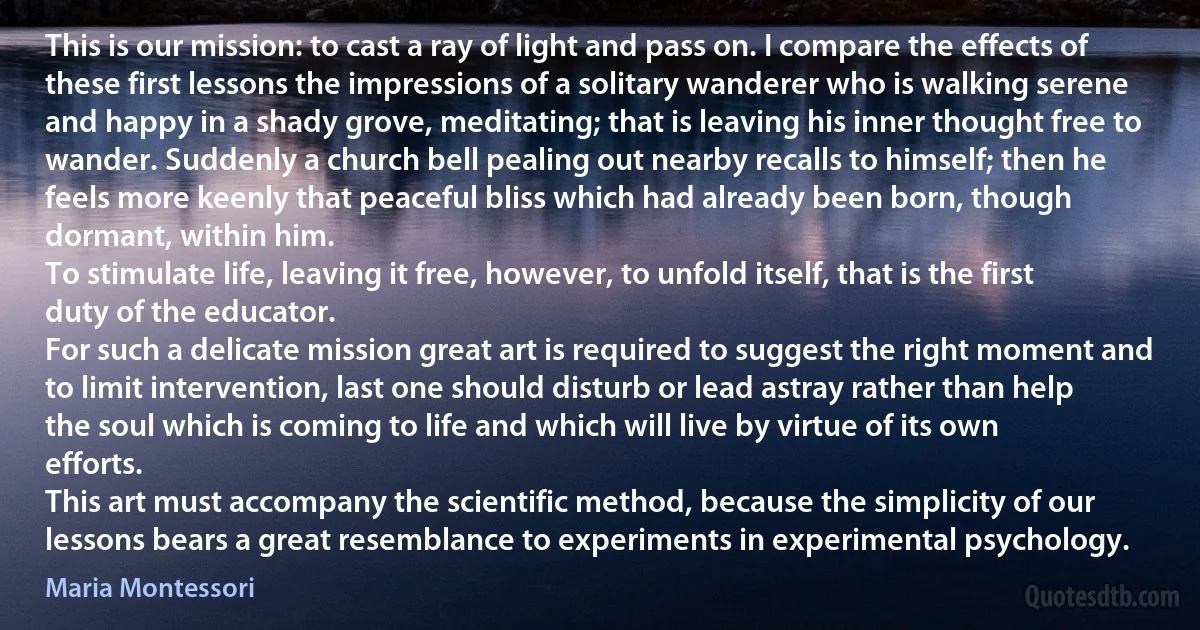
This is our mission: to cast a ray of light and pass on. I compare the effects of these first lessons the impressions of a solitary wanderer who is walking serene and happy in a shady grove, meditating; that is leaving his inner thought free to wander. Suddenly a church bell pealing out nearby recalls to himself; then he feels more keenly that peaceful bliss which had already been born, though dormant, within him. To stimulate life, leaving it free, however, to unfold itself, that is the first duty of the educator. For such a delicate mission great art is required to suggest the right moment and to limit intervention, last one should disturb or lead astray rather than help the soul which is coming to life and which will live by virtue of its own efforts. This art must accompany the scientific method, because the simplicity of our lessons bears a great resemblance to experiments in experimental psychology.
Maria MontessoriRelated topics
art born bell cast church coming compare dormant duty educator experimental free great happy help intervention last lead leaving life light live moment pass psychology ray right should soul thought unfold virtue walking nearby feelsRelated quotes
It may be observed of mathematicians that they only meddle with such things as are certain, passing by those that are doubtful and unknown. They profess not to know all things, neither do they affect to speak of all things. What they know to be true, and can make good by invincible arguments, that they publish and insert among their theorems. Of other things they are silent and pass no judgment at all, choosing rather to acknowledge their ignorance, than affirm anything rashly. They affirm nothing among their arguments or assertions which is not most manifestly known and examined with utmost rigour, rejecting all probable conjectures and little witticisms. They submit nothing to authority, indulge no affection, detest subterfuges of words, and declare their sentiments, as in a court of justice, without passion, without apology; knowing that their reasons, as Seneca testifies of them, are not brought to persuade, but to compel.

Isaac Barrow
Denying miracles, the Teacher pointed out the concealed powers of human nature which, when developed, can produce the so-called miracles.
The method of developing these powers is interpreted in Buddhist books and is known under the name of the science "Iddhi-Vidhanana,” which points out two forms of manifestation of these powers and two ways to attain them. One, the lower, is reached by way of various ascetic and other physical practices; the other higher one, embracing all possible manifestations, is attained by the power of inner development. The first method of developing these powers is not lasting and may be lost, whereas inner development can never be lost. Its mastery is attained by following the noble way indicated by Buddha. All these hidden powers gradually unfold in man, usually of themselves, in proportion to man's mastery of the lower expressions of his nature in a whole series of previous lives.

Helena Roerich
Interviewer: France has announced that it is planning to withdraw its troops from the Central African Republic at the end of the year. Is this good or bad news?
Catherine Samba-Panza: The international community, be it the United Nations, the European Union or friendly countries like France, has been helping us from the very first hours of the crisis. Regional organizations like the African Union have accompanied us throughout all our difficulties. However, this is very expensive. So all these countries and organizations need to consider up to which limit they are able to continue with their efforts. We took note of France's intention to start withdrawing their troops right at the end of the transitional period. We can all see that the French Sangaris mission is still of great help for the mission of the European Union as well as the UN peacekeeping mission MINUSCA. So I would say that it is a withdrawal, but not a total withdrawal.

Catherine Samba-Panza
To conclude, if we call light, those rays which illuminate objects, and radiant heat, those which heat bodies, it may be inquired whether light be essentially different from radiant heat? In answer to which I would suggest that we are not allowed, by the rules of philosophizing, to admit two different causes to explain certain effects, if they may be accounted for by one. ...If this be a true account of the solar heat, for the support of which I appeal to my experiments, it remains only for us to admit that such of the rays of the sun as have the refrangibility of those which are contained in the prismatic spectrum, by the construction of the organs of sight, are admitted under the appearance of light and colors, and that the rest, being stopped in the coats and humors of the eye, act on them, as they are known to do on all the other parts of our body, by occasioning a sensation of heat.

William Herschel
What can I write about Vytautas Juozapaitis? Months ago, a singer with this same name gave one of the most Mozartean accounts of Don Giovanni I've ever experienced: a lean, yet warm sound, exciting and a little on the dangerous side - utterly (and wonderfully) self-absorbed. The man singing Giorgio Germont could not possibly have been this same artist. This was Verdi singing of the highest order - as if to the manor born. A molten, rich expressivity and attention to Verdian line that in its size, detail and musicality recalled the greats: Gorin, Merrill... you get the idea. The name may not trip off American tongues with ease... yet, but in an era often thought bereft of Verdian voices Juozapaitis is the real deal. Every moment of his Germont was filled passion and, like all of the cast members, every word of the Italian was naturally produced and understandable. Mama mia this man's got it!

Vytautas Juozapaitis
